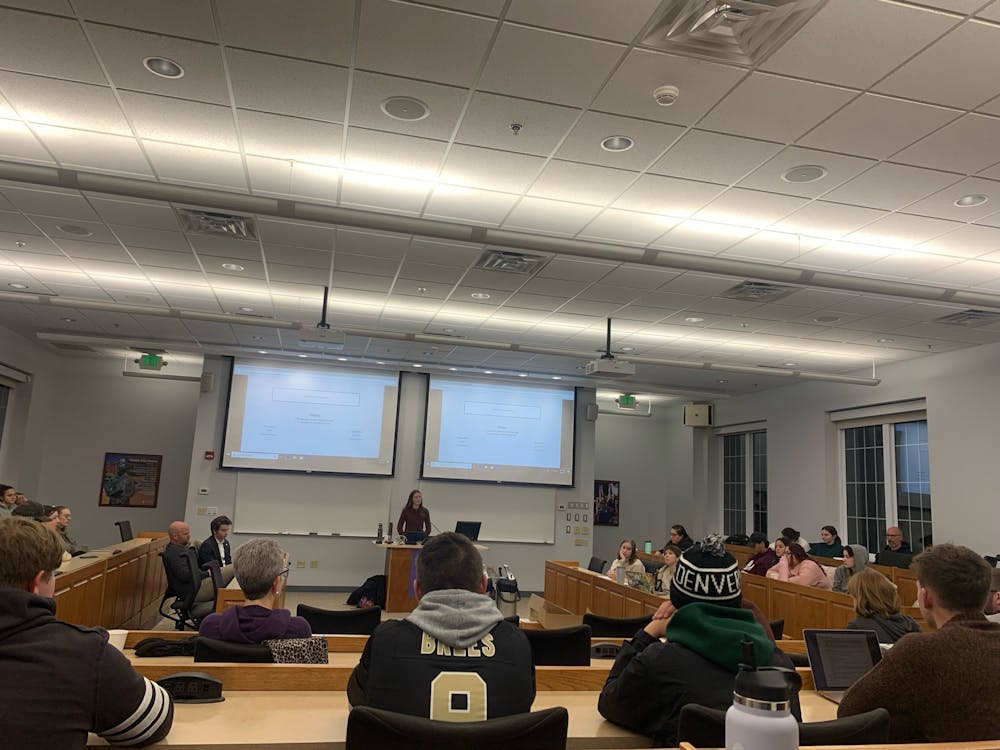On March 8, Taylor’s Oxford Union Debate Society hosted a conversation discussing the ethicality behind transgender women competing in women’s sports.
The event lasted an hour and was moderated by senior and Oxford Union Debate Cabinet member Clare Van Prooyen.
Seniors Pia Briz and Amanda Williams argued in support of transgender women competing in women's sports. Sophomore Peter Schwarck and men’s soccer coach Gary Ross argued against the proposition.
The debate featured short presentations from each side, followed by counter-arguments, a 30 minute question and answer session with the audience and concluding statements by each side.
This structure follows the guidelines set out by the Oxford Union debating forum originally founded in 1823 as a way to promote discussion worldwide.
In line with these goals, Taylor’s Oxford Union sought to bring new conversations to campus through this debate.
“I hope, first, that more conversation will come from this conversation,” Van Prooyen said. “We're blessed to be able to grow in our faith during our time at Taylor, but does this mean anything if we don't know how to put it into practice? Talking about transgender men and women is a sensitive topic to the majority of Christians. We need to be able to enter into a conversation about topics like this, handle the conversation with grace, hear those we disagree and agree with (one side is not necessarily right), and still love the person we are talking to.”
The two sides acknowledged their shared faith and then followed the structure laid out for them.
The opposition, arguing against sport participation by transgender women, presented a defense with three components: the physical makeup of athletes, the risk of injury and the possibility of Title IX inequity violations.
The first point made by the team considered the differences between bone density, musculature and aptitude for fitness in biological males and females.
According to Transequality.org, “A transgender woman lives as a woman today, but was thought to be male when she was born.”
“We can look around this room … and see that biological males by and large are bigger, stronger and faster than biological females,” Ross said.
He then went on to say that transgender women share a physical makeup with biological males, rendering them a competitive advantage in sport activity.
Ross continued with his second point which focused on the prospect that biological female athletes may be injured when interacting with a transgender female during sport competition — specifically in contact sports.
“Bigger, stronger, faster objects when coming in contact with slower, weaker and smaller objects will destroy those objects,” Ross said. “Biologically speaking, there’s a distinct competitive advantage as well as a clear and present danger to the biological female with respect to competition.”
Finally, Ross offered a brief history on the intersection between Title IX and its goal to ensure equality for women in sports. After this, he broke down the possible violations caused by transgender women particiaption in collegiate sports.
“Anytime you have a transgender woman … moving over to a women’s sport, that takes the place of a female athlete, and it doesn't just take the place of a female athlete in terms of her capacity to compete athletically, it actually puts in jeopardy her potential for an education because there are scholarship opportunities,” Ross said. “This is a Title IX violation.”
The proposition, arguing in support of transgender women participating in sports, also presented an argument with three components: common misconceptions, an oppositions’ overemphasis on testosterone levels, and the inconsistent thinking surrounding discussion on this topic.
“It is a misconception to think this is a new topic,” Briz said. “People think this is a new topic and that there aren’t decades of data we go upon. Trans people have been competing for decades.”
The team then explained the ways in which data does not reveal a direct correlation between higher testosterone levels and increased athletic caliber.
“When hormone therapy and puberty blockers are used they block testosterone and in some cases increase estrogen, inducing feminine sex characteristics,” Williams said. “The main thing people are worried about is testosterone, but there is actually no clear link between performance and testosterone levels … if testosterone is higher, it does not necessarily mean that a person is going to be a better athlete.”
Finally, the proposition called on the Christian Church to take a look at the consistency and disposition regarding the topic.
“The Church does not ask anyone to only be born with blonde hair or brown eyes, so why are they making any conditions for trans people to be accepted?” Briz said.
After both sides presented and engaged in counterarguments, the audience question and answer session began and lasted for 25 minutes. Following this, both sides presented closing arguments.
All people present for the event then voted on a winner. The notion that transgender women should be able to participate in women’s sports won the debate.
Senior Sam Ranger attended the discussion and continues to talk about these topics following the debate.
“I have an interest in learning more about the LGBTQIA+ community and think the entire campus should as well,” Ranger said. “Those in this community statistically make up a large percentage of the campus population and I think it is our duty, as a liberal arts institution, to foster care and educate ourselves for groups like these who are often stigmatized and marginalized … I think it was fruitful and has led to many beneficial and necessary conversations around campus.”
To Van Prooyen, these conversations are an essential piece to the success of this dialogue.
“It never fails that during the debate I see at least one or two people that are upset by the conversation,” Van Prooyen said. “At the end of each debate, I say that I'm happy they got upset because that is why I want to have these conversations. Not to be controversial, but to spark feelings and emotion so we can learn how to handle tough conversations. There's no better place than Taylor University to learn how to grow in our ability to communicate and disagree.”




